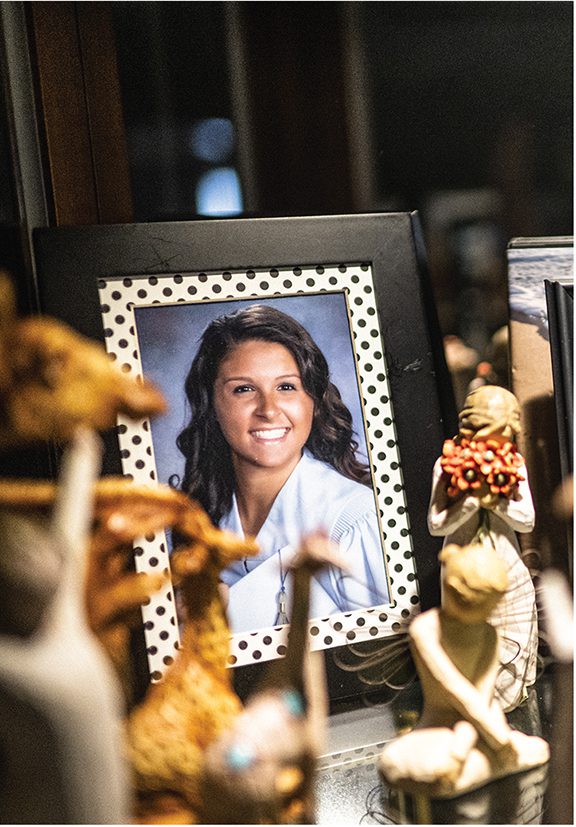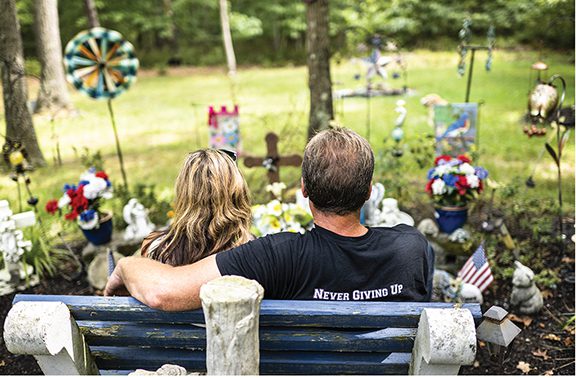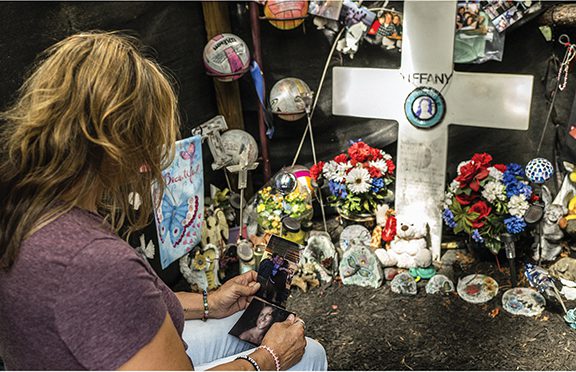Steve and Dianne Valiante
Photography by David Michael Howarth
Tiffany Valiante was wearing new shoes.
 She’d just graduated from Oakcrest High School in Mays Landing, where her athletic, 6´2˝ frame had carried her to volleyball stardom as a middle hitter. She’d accepted a scholarship to play at Mercy College in New York and was exchanging texts about dorm decor with her future roommate. She would major in criminal justice, maybe eventually become a detective. She had a part-time job at Wawa. She was planning a trip to Six Flags with her friends, and had a dentist appointment scheduled to find out if she needed her wisdom teeth removed. She had a busy summer of graduation parties and beach days ahead.
She’d just graduated from Oakcrest High School in Mays Landing, where her athletic, 6´2˝ frame had carried her to volleyball stardom as a middle hitter. She’d accepted a scholarship to play at Mercy College in New York and was exchanging texts about dorm decor with her future roommate. She would major in criminal justice, maybe eventually become a detective. She had a part-time job at Wawa. She was planning a trip to Six Flags with her friends, and had a dentist appointment scheduled to find out if she needed her wisdom teeth removed. She had a busy summer of graduation parties and beach days ahead.
She was wearing brand new shoes when she vanished from her driveway just before 9:30 pm on July 12, 2015. She wasn’t wearing them anymore when, less than 2 hours later and about 4 miles from her home, Tiffany was hit and killed by a train speeding at 80 miles per hour toward Atlantic City.
After a short investigation by the New Jersey Transit police, Tiffany’s death was ruled a suicide. The official report told the story of a distraught teen who’d run onto the tracks. In many ways, the world outside the family moved on. There was a candlelight vigil at the high school, and a memorial mass at the Catholic church. The graduation parties still happened, and volleyball practice began at Mercy College in the fall. But for the Valiante family, there were still questions.
Their daughter had no history of mental illness. They knew she was the person friends all came to for help with their problems, and Tiffany was always ready to point out a silver lining. The 2 engineers who were operating the train gave conflicting statements in the weeks after the crash, and the condition of Tiffany’s body made a conclusive autopsy almost impossible. Tiffany’s shoes were nowhere to be found, and her feet showed no indication that she’d walked barefoot over the sharp stones along the tracks, let alone for miles. Her shorts were missing, and her cell phone, which was found in the bushes along her driveway, showed a call that was answered 30 minutes before she died.
Tiffany’s family was certain the reports were wrong. Their daughter didn’t – wouldn’t – commit suicide, and they believed an investigation would uncover the truth and lead to the person or people responsible for her murder.
“I know there’s a killer out there. I do,” says Dianne Valiante, Tiffany’s mom. “In my heart and soul, I know somebody killed my baby. Somebody did this to her. And that’s why we’re fighting so hard.”
For 7 years, Valiante and her family have been filing lawsuits asking for the investigation to be reopened. They’ve put up signs begging for information about Tiffany’s death and offering a $40,000 reward for leads. Even the media has gotten involved – most recently, the new season of the Netflix series “Unsolved Mysteries,” features an episode covering Tiffany’s story.
“We’ve never really grieved our daughter,” she says. “How could we? We’ve just been fighting and fighting.”
 On the day Tiffany died, her cousin, who lived just across the street on Tilton Road, was having a graduation party. Tiffany spent the day swimming and hanging out with her family. In the evening, she got out of the pool and went home, Valiante says, to shower and change. Around the same time, Valiante got a call from one of Tiffany’s friends who said she needed to talk right away.
On the day Tiffany died, her cousin, who lived just across the street on Tilton Road, was having a graduation party. Tiffany spent the day swimming and hanging out with her family. In the evening, she got out of the pool and went home, Valiante says, to shower and change. Around the same time, Valiante got a call from one of Tiffany’s friends who said she needed to talk right away.
Valiante and her husband Steve went home, and the girl and her mother pulled into the driveway. They accused Tiffany of using her friend’s debit card without permission. There was a lot of yelling, Valiante says, and Tiffany denied everything. The girl and her mother got back in their car and left the driveway.
 Valiante suggested they search Tiffany’s car for the lost debit card. When she caught Tiffany trying to slip the card into her pocket, the teenager came clean and explained to her mother why she’d used it. It was, as Valiante describes it, a young person’s lapse in judgment. Though the whole story was still unclear, Valiante lectured Tiffany, then went inside to get her husband. When they came back outside, Tiffany was gone. It was 9:30 pm.
Valiante suggested they search Tiffany’s car for the lost debit card. When she caught Tiffany trying to slip the card into her pocket, the teenager came clean and explained to her mother why she’d used it. It was, as Valiante describes it, a young person’s lapse in judgment. Though the whole story was still unclear, Valiante lectured Tiffany, then went inside to get her husband. When they came back outside, Tiffany was gone. It was 9:30 pm.
When she didn’t answer her phone or reappear over the next hour, the Valiantes called in reinforcements to help search for Tiffany. Her older sisters and uncle, who’s a former state trooper, joined the search, scouring the nearby woods on quads and driving around to look for her. Just after 11 pm, Steve Valiante found his daughter’s cell phone near the end of the driveway. He’d passed that same spot earlier in the search and was sure it wasn’t there before.
“And all of a sudden her phone appears,” Dianne Valiante says. “So he comes up the driveway with it in his hand and he’s upset because he knows Tiffany goes nowhere without that phone.”
The search continued into the early morning hours. Meanwhile, unbeknownst to Valiante or the search party, a medical examiner had arrived on the scene of a grisly train accident 4 miles away. She pronounced a person – all but unidentifiable due to the violence of the train strike – dead. After speaking with Tiffany’s retired state trooper uncle, New Jersey Transit police determined that the remains were hers.
“I remember a car pulling in,” Valiante says, “and my brother-in-law got out of the backseat. And I heard him say, ‘Tiffany got hit by the train,’ and my 2 kids were just screaming. And my husband is screaming and I’m like, ‘What did you just say to me?’”
 The family was left reeling. They didn’t attend the candlelight vigil – “I was not in my right mind,” Valiante says – and Tiffany’s cremation and funeral service, 8 days after her death, passed in a blur.
The family was left reeling. They didn’t attend the candlelight vigil – “I was not in my right mind,” Valiante says – and Tiffany’s cremation and funeral service, 8 days after her death, passed in a blur.
Once the shock began to fade, though, the questions began. The engineer and student engineer who were operating the train at the time of the accident were interviewed multiple times on record. At first, the student engineer said Tiffany had “darted out” from the woods. Later, he said he only saw Tiffany at the last second. In a third interview, he said he’d seen her from about a quarter-mile away, standing by the tracks. In each version of the story, he and the supervising engineer said they rang the train’s bell. Later, the black box recording would show the bell never rang.
NJ Transit police collected Tiffany’s shirt from the scene (her body was clad only in underwear), in addition to an ax with “red markings.” Though bits of her bracelet – tiny gold turtle charms – were scattered on the tracks, investigators didn’t find her shorts or shoes, or the headband she’d been wearing.
No one interviewed the Valiantes. “They never asked me about my daughter. Not once,” Valiante says. “They didn’t ask what kind of child she was, did we have problems. They never asked me anything.”
Several weeks after Tiffany died, Dianne Valiante went for a walk to clear her head. She was about a mile from home when she spotted something under a tree. It was Tiffany’s shoes – neatly lined up as though they’d been placed there carefully – along with her headband, a keychain like those usually affixed to rental car keys, and a sweatshirt Valiante didn’t recognize.
She called her husband, who called the police to come and collect the evidence. The family thought they were about to get some answers, but that’s not what happened. Instead, the keychain was misplaced before it could be analyzed. NJ Transit detectives also lost the axe that had been found at the scene and left the teen’s shirt in a knotted plastic bag, where it grew mold that made it completely untestable.
Paul D’Amato, a personal injury attorney in Egg Harbor Township, heard the whole story and knew the Valiantes needed help. He’s represented the family pro bono for several years, filing multiple lawsuits in an attempt to get complete reports released by NJ Transit, to have evidence re-examined, and to get the official cause of death on Tiffany’s death certificate changed from “suicide” to “undetermined,” which might allow the case to be reopened.
D’Amato collected independent reports and analyses from forensics experts, investigators, and even a retired Atlantic County Senior Medical Investigator, who wrote a 20-page report concluding, in no uncertain terms, that the cause of death should be amended and the case re-investigated.
In 2018, the state medical examiner evaluated that request. He wrote in a letter to D’Amato that he had reviewed new information, including a deposition from one of Tiffany’s friends that said she had, in fact, been struggling with mental health issues. Tiffany’s relationship with her parents was occasionally strained over the year before her death. She and her mom had briefly attended counseling. At the beginning of 2015, Tiffany came out as gay. Valiante says she and Tiffany’s dad were supportive, but a few classmates told investigators she was having a rougher time than she may have let on at home.
With all of that in mind, the medical examiner decided the cause of death should remain suicide and sent his condolences to the Valiantes.
 In the Valiantes’ backyard, there’s a regulation-size beach volleyball court. Steve Valiante built it after Tiffany died. Nearby, there’s a memorial garden with a plaque. A few miles away, along the tracks, there’s another memorial with photos of Tiffany and a bench.
In the Valiantes’ backyard, there’s a regulation-size beach volleyball court. Steve Valiante built it after Tiffany died. Nearby, there’s a memorial garden with a plaque. A few miles away, along the tracks, there’s another memorial with photos of Tiffany and a bench.
In the Valiante’s house, Tiffany’s bedroom remains mostly untouched. The clothes she bought to take to college are still in their bags. “So many people gave me things, you know, volleyballs and mementos. I have actually 2 full cabinets,” Valiante says. “And then there’s a couple pictures we had blown up for the funeral home. And everything else is pretty much just the way she left it.”
With no new leads and no willingness on the part of NJ Transit or the state medical examiner’s office to take another look, the Valiantes’ quest has reached something of a dead end. But they can’t move on. It’s especially difficult, Valiante says, for her 2 older daughters, now in their late 30s.
 “It’s been very hard on our relationship through all this because it’s been a battle for 7 years,” she says. “They are trying to raise their children, and they’re seeing, you know, things written about their sister and it’s been really hard on them. It’s taken a toll on our family.”
“It’s been very hard on our relationship through all this because it’s been a battle for 7 years,” she says. “They are trying to raise their children, and they’re seeing, you know, things written about their sister and it’s been really hard on them. It’s taken a toll on our family.”
But the more that’s written about Tiffany, she believes, the better. Valiante still sobs, hard, when she tells the story. She’ll keep telling it anyway. “Maybe people think I’m crazy but I don’t care,” she says. “This is why I’m fighting so hard, because I know my daughter didn’t do this. I need to know that I got her justice – that I did everything and anything I could. I just know that we need to be our daughter’s voice. If we don’t, then who will be?”














